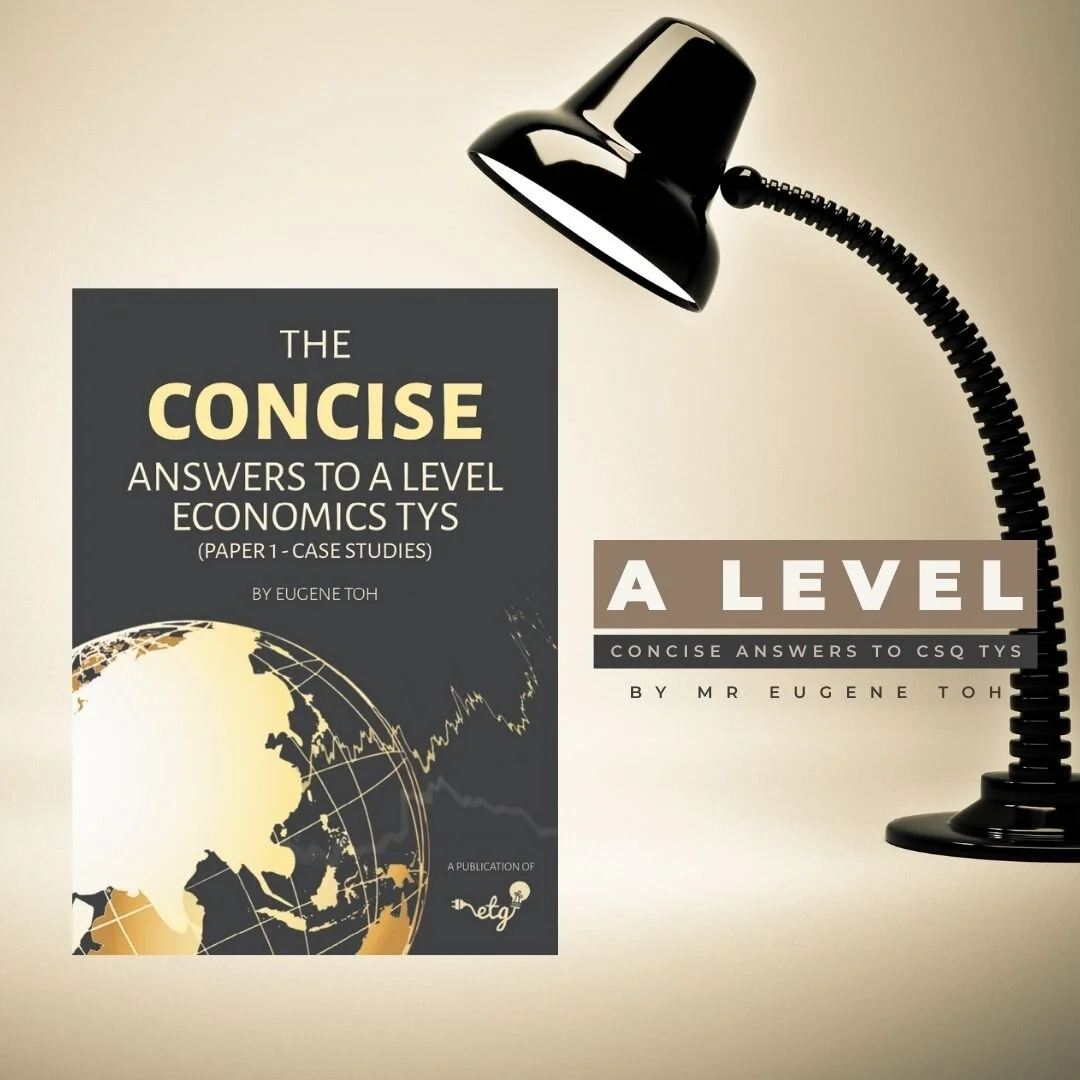(2019) 9757 H2 Econs Paper 1 CSQ 2 Suggested Answers by Mr Eugene Toh (A Level Economics Tutor)
a. Generally, from 1987 to 2017, manufacturing employment has been decreasing yet real manufacturing output has been increasing.
This could suggest an increase in productivity as each unit of labour is able to produce more output, which is why there is an increase in output even as there is less labour hired.
b. Firms can enjoy internal economies of scale. Through specialising in the production of a specific part in large scale, firms can invest in advanced machinery and equipment which can lower the cost of production through increased efficiency.
c. The theory of comparative advantage suggests that a country should import what it does not have a comparative advantage in and specialise & export in what it has a comparative advantage in.
Singapore’s high % of foreign inputs in an economy’s exports shows that it is towards the end/final stages of production which will likely indicate that Singapore, due to the abundance of skilled labour and knowledge has a comparative advantage (incurs a lower opportunity cost) in producing higher value goods while importing intermediate / unfinished goods.
d. Reduce unemployment / increase employment
1. Tariffs will increase the prices of imported goods
2. Locals will be encouraged to switch to consuming domestically produced substitutes
3. Increased demand for domestically produced substitutes —> increase demand for labour to produce such goods à increase in employment
Reduce current account deficit
1. Tariffs will increase the prices of imported goods
2. Assuming that demand for imported goods are price elastic (given that they are easily substitutable) – an increase in price will lead to a more than proportionate fall in quantity demanded —> import expenditure will fall
3. Increase in (X-M) —> improves current account —> improves BOP
e.
f. Globalisation is reversible
1. Global trade to GDP ratio has fallen from 52% to 45% since Global Financial Crisis in 2008 —>this could suggest that economies are no longer as interdependent as they used to?
2. Firms appear to be increasingly keeping production domestic instead of moving them overseas —> evidence of fall in MNC cross border investment by 15% in 2016
3. Current context #1 à Present U.S.-China trade-war, Japan-SouthKorea trade dispute etc —>increased movement away from free trade / globalisation
4. Current context #2 —>Brexit à dismantling of former agreements à likely increase in trade barriers / restricting of labour movements across borders / restriction of investments
Globalisation is not reversible
1. While the ratio has fallen, absolute trade may have gone up.
2. According to Extract 7, exports are rising, countries are pursuing free-trade deals
My view
1. Globalisation is reversible but it will take tremendous efforts to reverse
2. Why?
3. Reversing globalisation requires the countries to switch from focusing on the production of exports to the world market towards producing for just the domestic market
4. This requires pivoting and a re-focus of government policies (such as what China was attempting to do from switching from export-led growth to domestic driven growth)
5. In addition, protecting home industries through anti-globalisation policies may not yield the desired results
6. Instead, what could happen instead is, firms & consumers instead of switching to domestically produced goods, they just simply look elsewhere – where goods are cheaper but from another country
Book a Gaps & Competencies Assessment to find out
What are problems in your essay-writing
Which specific skill you are lacking to answer case study questions
What gaps do you have in understanding key concepts
Which topics are you weaker in
The Gaps & Competencies Assessment is 45 minutes long and is a 1-1 consultation with Mr Eugene Toh. At the end of the assessment you will also receive a report outlining your issues. You will also receive a FREE copy of our A Level Concise TYS Answers (CSQ)
Simply click here to book an assessment and our administrators will follow up with you within 24 hours. A diagnostic test will be sent for your to attempt at your own time prior to the Assessment.
Price of the 45 mins assessment: $15 (U/P: $90)
Found our TYS answers useful?
Maximise your A-Level H2 Economics preparation with the ETG A-Level H2 Economics TYS Crashcourse! Perfect for students looking to enhance their skills in both essay and case study analysis, this comprehensive 3-day crashcourse will cover over 60 essay questions and 20 case studies from the A-Level Economics Ten-Year Series. Whether you're attending onsite or via Zoom, our experienced tutors will guide you through the intricate demands of H2 Economics, offering expert feedback and graded answers. For the best economics tuition in Singapore, sign up now to secure one of the limited onsite seats!


